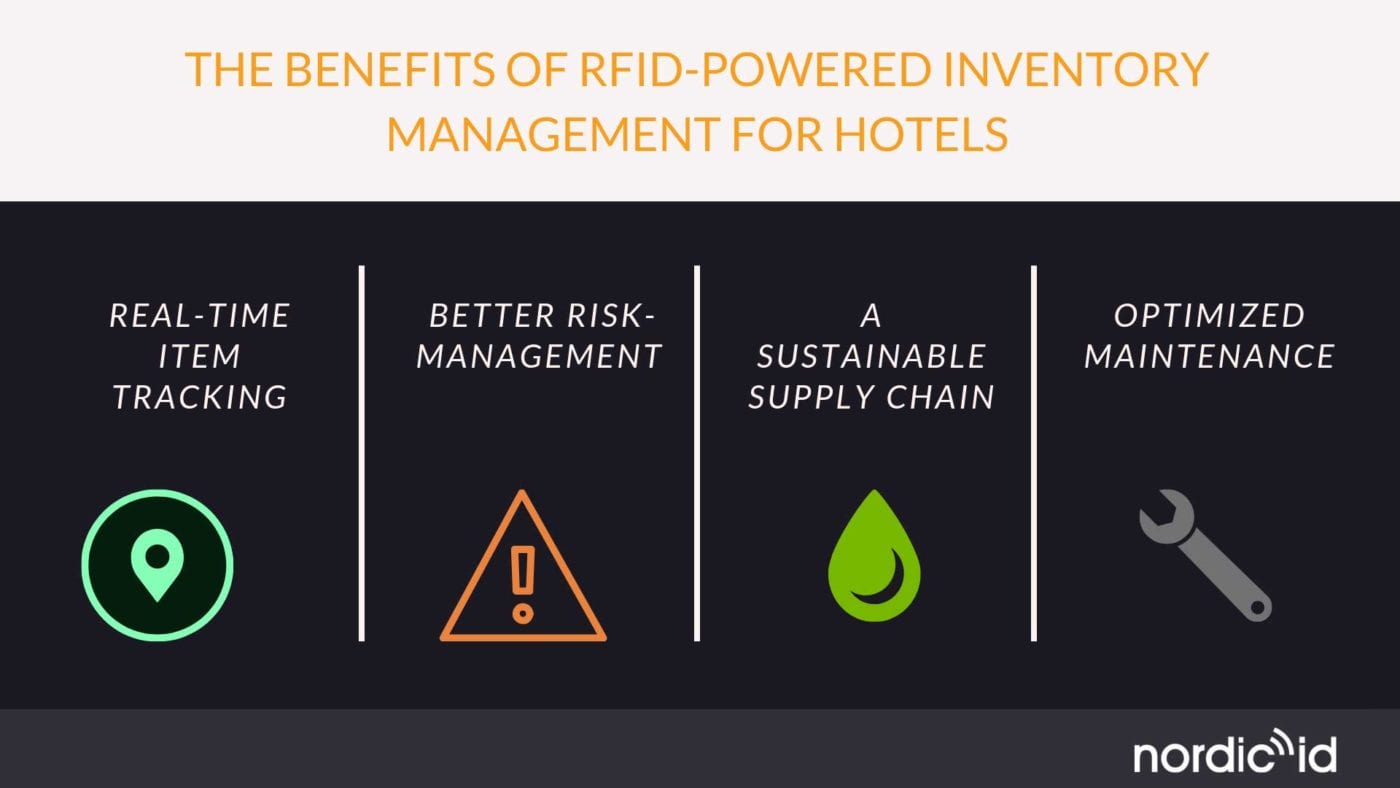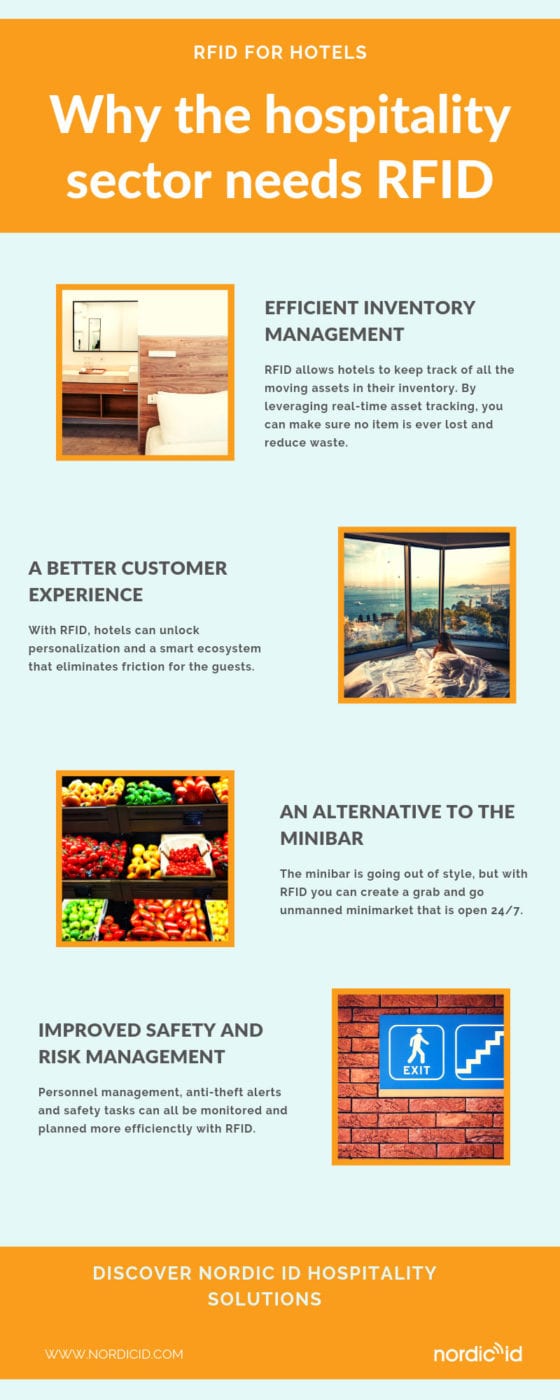Hotels need better inventory management
When talking about RFD, we all acknowledge the positive impact of RFID in asset-heavy industries like retail and logistics. However, there is one sector that is just beginning to realize not using RFID is a huge missed opportunity. Hospitality has been constantly engaging with innovative technologies to enhance the customer experience and stand out in a competitive environment. Therefore, it’s not surprising that more and more hotels are adopting RFID solutions.
In fact, RFID or Radio-Frequency Identification is currently the best technology available for asset tracking and inventory management. Hotels deal with hundreds of assets that are constantly moving in and out of their premises and can highly benefit from a smart inventory.
With smart inventory managements, hotels can:
- Keep track of each item in their inventory
- Optimize maintenance and replacement
- Discourage theft and improve safety
- Reduce losses and cut waste
- Implement better sustainability practices

By deploying IoT and digitalizing their inventory, hotels can make better use of the items in their stock. Moreover, as RFID-powered solutions are easy to scale, the potential for optimization is nearly endless. Putting it in simpler terms, while the benefits of asset tracking are self-explanatory, there are other potential uses of RFID that are less obvious, yet just as powerful.
By acquiring a complete overview of their assets hotels will also learn how to optimize their supply chain and inventory management. This will allow them to avoid overstock, reduce waste, and guarantee transparency and a more sustainable approach to resource use.
A more efficient inventory is necessary to ensure compliance with circular economy principles and a significant reduction in waste. By embracing sustainability, hotels can also offer a more ethical alternative to eco-conscious travellers, especially as the awareness of the negative effects of Airbnb grows.
Hotels want to deliver a better customer experience
The hospitality industry has always had to balance the desire to deliver the best possible customer experience with budgetary constraints. In the day of TripAdvisor and social media, providing an ever-improving customer experience is paramount. Furthermore, the hospitality sector is aware of the benefits of brand loyalty, especially when operating chain hotels that serve multiple needs in different areas of the world.
How do hotels stand out in a context of increased competition, sharing economy, the prioritization of experiences over accomodation, “do it for the gram”?
Surprisingly, RFID can offer numerous possibilities when it comes to personalization, safety, and better customer experience.
For example, Disney uses Radio Frequency technology to make check-in faster, unlock hotel doors, speed up the purchase of merchandise and food, and leverage fast track entry for popular attractions. With the use of RFID, there is less friction, time wasted, and significantly more seamless customer experience.
The death of the minibar
Let’s take another traditional staple of many hotels that is rapidly disappearing: the hotel minibar and the hotel lobby convenience store seem to be past their heyday.
“Mini-bar sales dropped a stunning 28 percent from 2007 to 2012″ according to a study from PKF Hospitality Research
While reports of the death of the minibar might be greatly exaggerated, many hotel chains like Grand Hyatt, Hilton, and Marriott are phasing out the minibar entirely. The ubiquity of convenience stores, online delivery services, and the appetite for curated experiences featuring artisanal local products and aesthetically pleasing snacks, have all contributed to making the minibar less and less popular.
In fact, according to a survey by TripAdvisor, the minibar is the least important hotel amenity for U.S. travellers.
An alternative solution some hoteliers have adopted would benefit from RFID: the “grab and go” mini-market model can be easily set up in your hotel reception area or even on every floor. With RFID, you can roll out an unmanned automated store that can be open 24/7 and can be easily integrated with your existing technology.
This allows you to keep prices competitive, easily identify what’s selling well and what isn’t, quickly replenish your stock when needed, and deliver a seamless customer experience that doesn’t require carrying around exact change like with most vending machines. By having a transparent view of your inventory in real-time, you are also able to introduce more fresh produce and healthy options, and prioritize sustainable, local food.
Hotels want to guarantee the safety of their assets
Hotels are, by definition, transient spaces where a huge number of people pass through every day. Property damage and theft are a concern, especially in the case of valuable items. By introducing RFID to track artworks, precious wine bottles (like this hotel in Mexico City), and electronics, hotels can ensure that nothing valuable will leave their premises.
RFID can also be used to optimize personnel management and improve risk management and safety. For example, employees can be monitored, maintenance and emergency alerts sent in real-time, and staff management optimized for increased efficiency.
A system that allows you to have a complete overview of your inventory in real-time also enables you to focus on what makes a bigger difference to your guests. Automating inventory management and asset tracking frees you and your staff to focus on delivering the customer-centric experience that makes hospitality profitable and satisfying for all parties.
Nordic ID RFID Solutions for hospitality
When you are working in hospitality, you need solutions that support, rather than hamper, your efforts in customer care, and this is where our long experience in delivering scalable, flexible solutions proves particularly useful.
Our software solutions for hospitality focus on what matters the most for our clients and the industry at large: tracking assets in real-time and inventory and personnel management.
We have also developed a flexible and scalable grab and go automated store model that can easily replace the hotel lobby shop.
Want to discover more? Contact us to learn more.
Download the infographic for a quick summary or check our RFID solutions for the hospitality sector.
